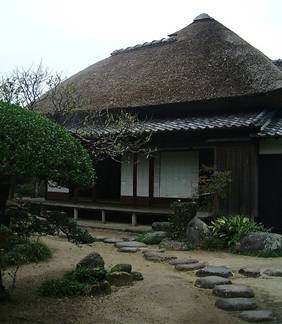
A tour of not one hell,
but several...
Nicholas Klar takes a visit to Fukuoka and Beppu on Kyushu Island, Japan - only to find himself in both hot spring heaven and hell.
Kyushu is Japan ’s southernmost main island and Fukuoka City the closest major gateway to Japan from other parts of Asia. One of the great benefits of flying into Fukuoka is that, compared to other major Japanese cities, the airport is only about fifteen minutes from the CBD. Fukuoka is a modern city, small for Japan, with around one million people. However it possesses all the trappings of larger metropolises.
One stop past Hakata (the main station) is Gion which was situated near our accommodation for the evening - Kashima Honkan. This is a delightful old inn dating back to the ‘Taisho’ period of about ninety years ago with many original features still intact. Their forty rooms are simple, Japanese-style, with tatami floors and futon for sleeping - plus communal toilets and bath. It is not luxurious by any means but it is inexpensive with a friendly staff. It has become busier since being listed in the most recent edition of Lonely Planet, so booking is essential. Rates are around ¥3,000-4,000 per person. The room we stayed in adjoined the central courtyard garden area which gave it a lovely aspect.
From Gion it is an easy a wander down past Canal City, a giant shopping mall that is an attraction in itself, and we also stopped by the picturesque
Kushida Shinto Shrine – one of the most famous in Southern Japan . Despite these distractions we were searching for the famous yatai of Fukuoka . These are famous small night food markets that nestle alongside the Nakagawa (Naka River) and around the Nagahama district. Late in the afternoon you can see these portable wagons being pulled along the streets by their owners to their nightly locations. At one point in time they numbered in the hundreds of an evening but have now declined to only a comparative handful. After settling on one establishment we sat down on their rickety plastic stools to enjoy a great meal of tonkatsu ramen, skewers and some special Kyushu chicken. However the price was not that cheap (relatively) and maybe this is one of the reasons for declining patronage of these establishments. It was a delightful spring evening and we enjoyed a few drinks whilst a diverse population of locals and tourists ambled by along the river
“Beppu gets a fairly bad rap from one of the more popular travel guides but, like many destinations, it depends on one’s perspective.”
The next morning we took an early train to Beppu from Hakata and even managed to get some family discount, all three of us travelling for just a little more than a regular single fare. Beppu is Japan ’s most famous onsen (hot spring) town, about two hours from Fukuoka . It gets a fairly bad rap from one of the more popular travel guides but, like many destinations, it depends on one’s perspective. Although all the rage amongst the Japanese, foreign travellers are scarcer in these parts, apparently sticking to the more frequented Tokyo-Mt. Fuji-Kyoto tourist routes.
On our first night we stayed at the Hotel New Tsuruta on the seafront in a typical tatami style room. This hotel is an easy walk from the eki (station). Our room had wonderful sea views and the onsen on the top floor also overlooked the ocean. In the evening we were served dinner in our room in traditional Japanese style, with a plentiful and delicious serving of local seafood. Special deals can sometimes be found amongst the many seafront hotels, depending on the season, and in this instance we paid what could be considered a reasonable ¥16,000 for the room, including dinner and breakfast.
Post-repast we went for an amble around the area near the hotel. Because of the popularity of the town for group and company tours the neighbourhood off the seafront is somewhat on the sleazy side with many laneways crowded with what seemed like hundreds of notorious ‘snack bars’ and ‘clubs’. According to various sources Beppu has the highest concentration of these in Japan . All milking the tourist yen one presumes, particularly those belonging to businessmen, and undoubtedly a good portion of it controlled by various ‘syndicates’.
In the morning I awoke early and decided to have an onsen whilst the sun rose, thinking I would find myself in solitary bliss. Unfortunately numerous others had the same idea but nonetheless it was a great start to a beautiful day. We took a pre-breakfast stroll along the waterfront past the yacht harbour encountering along the way an eclectic collection of the local populace - old folks out exercising in their yukata, Taiwanese ladies who introduced themselves as ‘tourists’ in a mixture of Chinese and Japanese (but looked suspiciously more like employees of one of the previously mentioned establishments), a man in a flimsy boat collecting seaweed, plus a small colony of homeless playing baseball on ‘Spa Beach’. Spa Beach is an artificial creation consisting of sand transported in from Queensland, Australia . A huge onsen complex overlooks the beach and one can partake of several different pools for a very reasonable price.
More available - please email for full article
Go back to see more articles
